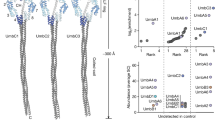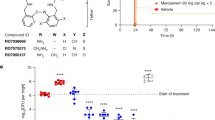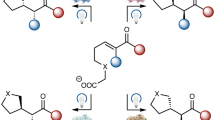Abstract
Hausmann and Craig1 first demonstrated that the peptide antibiotic polymyxin B was not homogeneous but could be separated by counter-current distribution into two components, polymyxin B1 and polymyxin B2. On hydrolysis, in addition to the amino-acids αγ-diamino-butyric acid, leucine, phenylalanine and threonine, polymyxin B1 gave (+) 6-methyloctanoic acid, which had previously been isolated and characterized by Wilkinson2. Polymyxin B2, although containing the same amino-acids gave an optically inactive acid, C8H16O2, not identical with n-octanoic acid but which was not otherwise characterized.
This is a preview of subscription content, access via your institution
Access options
Subscribe to this journal
Receive 51 print issues and online access
$199.00 per year
only $3.90 per issue
Buy this article
- Purchase on Springer Link
- Instant access to full article PDF
Prices may be subject to local taxes which are calculated during checkout
Similar content being viewed by others
References
Hausmann, N., and Craig, L. C., J. Amer. Chem. Soc., 76, 4892 (1954).
Wilkinson, S., Nature, 164, 622 (1949).
Author information
Authors and Affiliations
Rights and permissions
About this article
Cite this article
WILKINSON, S., LOWE, L. Identities of the Fatty Acids derived from the Polymyxins and Colistin. Nature 200, 1008–1009 (1963). https://doi.org/10.1038/2001008a0
Issue Date:
DOI: https://doi.org/10.1038/2001008a0
Comments
By submitting a comment you agree to abide by our Terms and Community Guidelines. If you find something abusive or that does not comply with our terms or guidelines please flag it as inappropriate.



